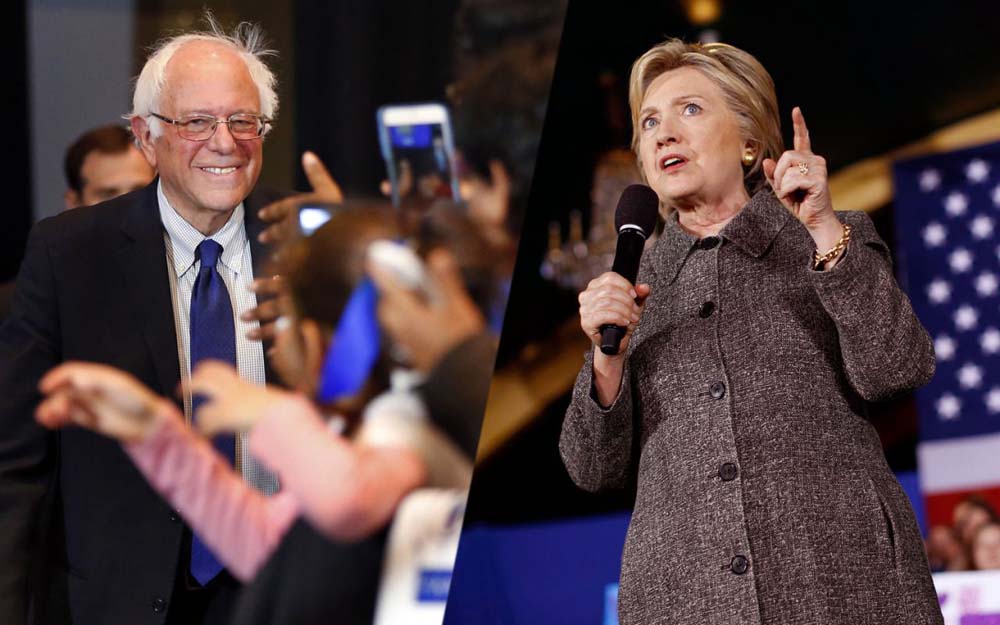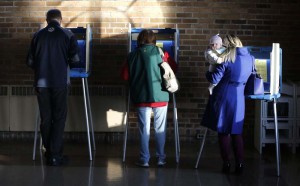- California Assembly OKs highest minimum wage in nation
- S. Korea unveils first graphic cigarette warnings
- US joins with South Korea, Japan in bid to deter North Korea
- LPGA golfer Chun In-gee finally back in action
- S. Korea won’t be top seed in final World Cup qualification round
- US men’s soccer misses 2nd straight Olympics
- US back on track in qualifying with 4-0 win over Guatemala
- High-intensity workout injuries spawn cottage industry
- CDC expands range of Zika mosquitoes into parts of Northeast
- Who knew? ‘The Walking Dead’ is helping families connect
Sanders has edge over Clinton in fast-moving race in Wisconsin

Sen. Bernie Sanders arrives for a campaign event in Milwaukee on Monday; Hillary Clinton speaks during a rally in Green Bay, Wis., on March 29. (Photos: Paul Sancya/AP; Patrick Semansky/AP)
Wisconsin has been a fast and furious fight for the Democratic presidential candidates. Both Hillary Clinton and Sen. Bernie Sanders, I-Vt., set up operations in the crucial state, which votes Tuesday, only in the last few weeks.
Most polls show Sanders with a single-digit lead in the race for Wisconsin’s 86 delegates. The Midwestern state, could now serve as a springboard for Sanders, building on a three-week hot streak since March 15, during which he has won five states and lost only one.
But the Badger State might not be the answer to the senator’s prayers. Clinton’s current delegate lead means Sanders would need a huge win in the state — and in several more going forward — to threaten the frontrunner. But the favorable poll numbers have Sanders’ campaign aides hoping to build on the recent momentum as they seek to keep Clinton from clinching the nomination.
Clinton’s campaign is keeping expectations low for the state. On Monday, her team sent a fundraising email with the subject line “We could lose Wisconsin.” Clinton’s presidential campaign manager Robby Mook sent out a memo outlining her “path forward.” The memo cited Clinton’s current delegate lead and noted Sanders cannot defeat her without winning “roughly 60 percent of the vote” in “the four remaining delegate-rich primaries — New York, Pennsylvania, California, and New Jersey.” Mook didn’t mention Wisconsin.
Sanders has performed well in the Midwest, but so far those victories have not been enough for him to catch up to the lead Clinton built in the South and with minority voters. And Tuesday’s contest doesn’t look to be a blowout win for the Vermont senator.
Wisconsin’s progressives have been drawn to Sanders, particularly in liberal Madison, the second largest city in the state.
“He does well in Madison, he obviously does really well,” Jessie Opoien, a reporter who covers state government and politics for the Madison-based Cap Times, said. “He also does really well in the western part of the state, which is sort of that more traditional, progressive grassroots, kind of populist sensibility.”
While Wisconsin’s electorate may favor Sanders, local leaders are largely backing Clinton.
“I think people expect Bernie to pull it out … but there’s also a sense that, either one, it wouldn’t be a huge surprise,” Opoien said. “She’s got the establishment support. There’s no question of that.”
Sanders’ recent wins made Wisconsin an unexpectedly important race, leading both campaigns to set up shop in a state they had largely overlooked. Joe Zepecki, a Democratic operative who is a veteran of many campaigns in the state, including President Barack Obama’s 2012 re-election bid, said the fight for Wisconsin was “certainly not a months-long campaign.” Zepecki, who is not working for either of the current Democratic campaigns, said Clinton’s team set up shop “a couple of days” after Sanders’ did.
Sanders’ Wisconsin director Robert Dempsey, who ran the show for the campaign in Minnesota as well, said the staff campaign effort in the state started about a month ago, and has focused on “very aggressive direct voter contact” through door-to-door canvassing and phone calls.
“We are reaching out to Wisconsinites across the spectrum,” Dempsey said, including members of the state’s Native American population, who are “very important for our overall strategy.”

Wisconsin voters in Milwaukee cast their ballots for the state’s primary on Tuesday. (Photo: Charles Rex Arbogast/AP)
He adds that although the campaign has only been in Wisconsin for a month, there was “a pretty aggressive volunteer base operation” in place for months before his arrival.
Opoien agrees, noting that grassroots Sanders supporters have been mobilizing in Wisconsin for months now. She recalled seeing groups of Sanders supporters last September at “Fighting Bob Fest,” an annual progressive activist gathering in the state.
“There were three or four different Bernie Sanders groups with tables there,” Opoien said of the festival.
Clinton’s campaign would not comment directly on its strategy, but Clinton’s Wisconsin spokesman, Yianni Varonis, said her team has offices in seven cities across the state. Varonis said in a statement that Clinton has “a nearly insurmountable lead in pledged delegates” in the race overall but remains “committed” to Wisconsin.
Clinton’s team includes operatives with deep experience in the state.
The Clinton campaign in Wisconsin is run by Jake Hajdu, who was the executive director of the state’s Democratic party until last year and has extensive experience getting out the vote for Democrats in Wisconsin. Hajdu returned to Wisconsin after working for Clinton in Iowa and Maine.
“Having him come back here made sense for them obviously to get stuff rolling quickly,” Opoien said, adding, “She’s got a couple of other folks working for her that have been involved in party politics here.”
One possible wild-card factor is Wisconsin’s open-primary rules, which allow people from outside the party to vote in the race.
“We’re an open state,” Zepecki says. “There’s no registration by party. You don’t even pick a different ballot up. Both races are listed on the same ballot.”
But voters have to choose which primary they will vote in. In states that have voted so far, Sanders has done well with independents and in open primaries. Zepecki said Wisconsin may be decided by how many independents choose to vote on the Democratic side of the ballot. It could spell trouble for Sanders if the chance to vote for — or against — Donald Trump lures independents to vote in the Republican primary instead.
“The only way I could envision a surprise, and that’s how I would characterize Clinton winning here, is if the independents go over to the Republican side,” Zepecki said.
Another Wisconsin law that could impact the Democratic primary is a voter ID law that passed in the state in 2011 and has not yet been in place during a presidential race. Zepecki said the law could affect a key Sanders’ base — college kids.
“If there is confusion and people … are disenfranchised I think it’s likely to be on college campuses,” Zepecki said. But “I think the order of magnitude is likely to be pretty small,” he added. “I think the universities have done all they can to educate folks and help them get what they need, but it has been a little confusing.”
Sanders’ campaign has also tried to educate Wisconsinites on the new voter ID law, explaining to them that they must show up with a photo ID with their current address on it or some other proof of their residency. Sanders has called the law “voter suppression,” and Clinton has also denounced it.
Dane County and its major city, the college town of Madison, is the main base of support for Sanders, but Dempsey said they have worked to drum up support across the state to win as many delegates as possible. Delegates will be awarded in each of Wisconsin’s eight congressional tickets rather than simply based on the total number of votes.
“If we were running a governor’s race we’d look to jack up turnout in Madison and then we go home. That’s not how this works,” Dempsey said.
But the delegate math could prove problematic for Sanders unless he performs far better than his promising poll numbers. Zepecki pointed to 2008 where President Barack Obama won just ten more delegates than Clinton in the state, despite beating her by a statewide margin of 18 percent. So, while Zepecki said a “five or six point victory” for Sanders is “expected,” he doubted it would change the daunting delegate math for him.
“A horse-race win has always been nice in terms of momentum, but I’m not sure that the way the state sets up he’s going to be able to get a big delegate haul,” Zepecki said.










![블랙핑크 로제(좌)와 제니(우) [로제 인스타그램·OA엔터테인먼트 제공. 재판매 및 DB 금지]](http://www.koreatimesus.com/wp-content/uploads/2025/04/AEN20250423001000315_02_i_P4-copy-199x223.jpg)




